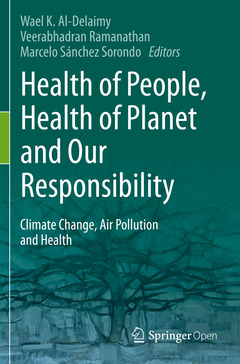Health of People, Health of Planet and Our Responsibility, 1st ed. 2020 Climate Change, Air Pollution and Health
Coordonnateurs : Al-Delaimy Wael, Ramanathan Veerabhadran, Sánchez Sorondo Marcelo

This open access book not only describes the challenges of climate disruption, but also presents solutions. The challenges described include air pollution, climate change, extreme weather, and related health impacts that range from heat stress, vector-borne diseases, food and water insecurity and chronic diseases to malnutrition and mental well-being.
The influence of humans on climate change has been established through extensive published evidence and reports. However, the connections between climate change, the health of the planet and the impact on human health have not received the same level of attention. Therefore, the global focus on the public health impacts of climate change is a relatively recent area of interest. This focus is timely since scientists have concluded that changes in climate have led to new weather extremes such as floods, storms, heat waves, droughts and fires, in turn leading to more than 600,000 deaths and the displacement of nearly 4 billion people in the last 20 years.
Previous work on the health impacts of climate change was limited mostly to epidemiologic approaches and outcomes and focused less on multidisciplinary, multi-faceted collaborations between physical scientists, public health researchers and policy makers. Further, there was little attention paid to faith-based and ethical approaches to the problem.
The solutions and actions we explore in this book engage diverse sectors of civil society, faith leadership, and political leadership, all oriented by ethics, advocacy, and policy with a special focus on poor and vulnerable populations. The book highlights areas we think will resonate broadly with the public, faith leaders, researchers and students across disciplines including the humanities, and policy makers.Wael Al-Delaimy is an epidemiologist and Professor of Global Health at the Department of Family Medicine and Public Health, University of California San Diego. He is co-founder and Associate Director of the UCSD Institute for Public Health. His research has focused on chronic diseases among children and adults and worked on studies of respiratory illnesses, cardiovascular diseases, diabetes and cancer. He helped introduce climate change and health as a new area to UCSD and the School of Medicine.
Veerabhadran Ramanathan is Frieman Endowed Presidential Chair in Climate Sustainability at the Scripps Institution of Oceanography, University of California, San Diego. Professor Ramanathan is an international leader in the science of climate change and in developing solutions for slowing global warming. In 1975, he discovered that the greenhouse effects of non-CO2 pollutant gases like Chlorofluorocarbons can warm the planet in significant ways. This discovery enabledthe Montreal protocol to become the first successful climate mitigation policy.
Msgr. Marcelo Sánchez Sorondo, Chancellor, Pontifical Academy of Sciences and Pontifical Academy of Social Sciences was born in Buenos Aires and was ordained a priest in 1968. He was lecturer in the history of philosophy at the Lateran University in Rome where he became full professor. He was dean of the Faculty of Philosophy at the same university and full professor of the history of philosophy at the Libera Università Maria SS. Assunta, Rome. In 1998 he was appointed Chancellor of the Pontifical Academies of Sciences and Social Sciences.Date de parution : 08-2022
Ouvrage de 417 p.
15.5x23.5 cm
Date de parution : 05-2020
Ouvrage de 417 p.
15.5x23.5 cm



